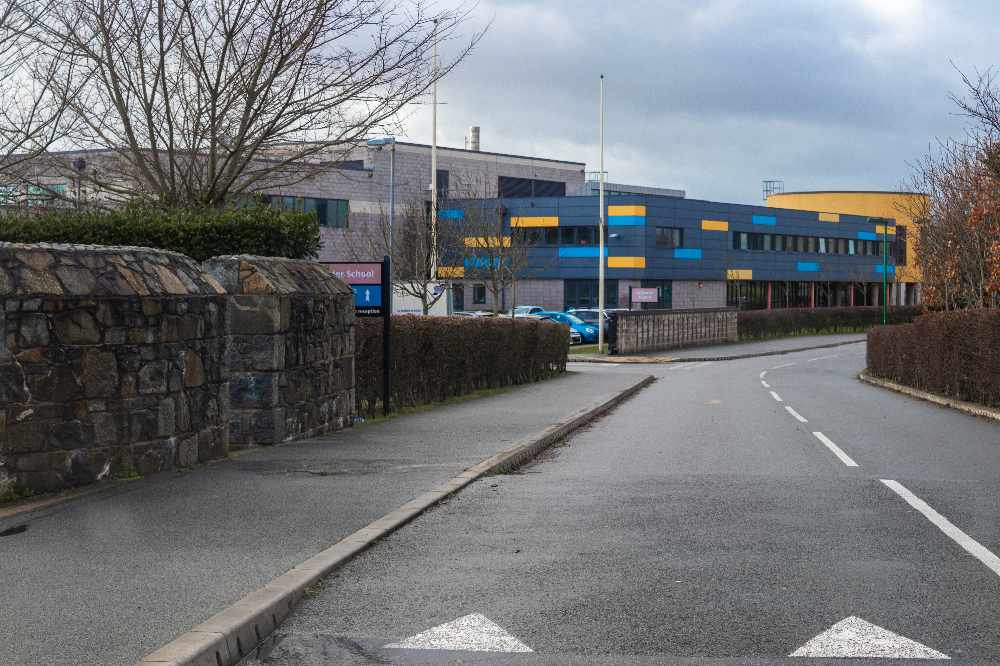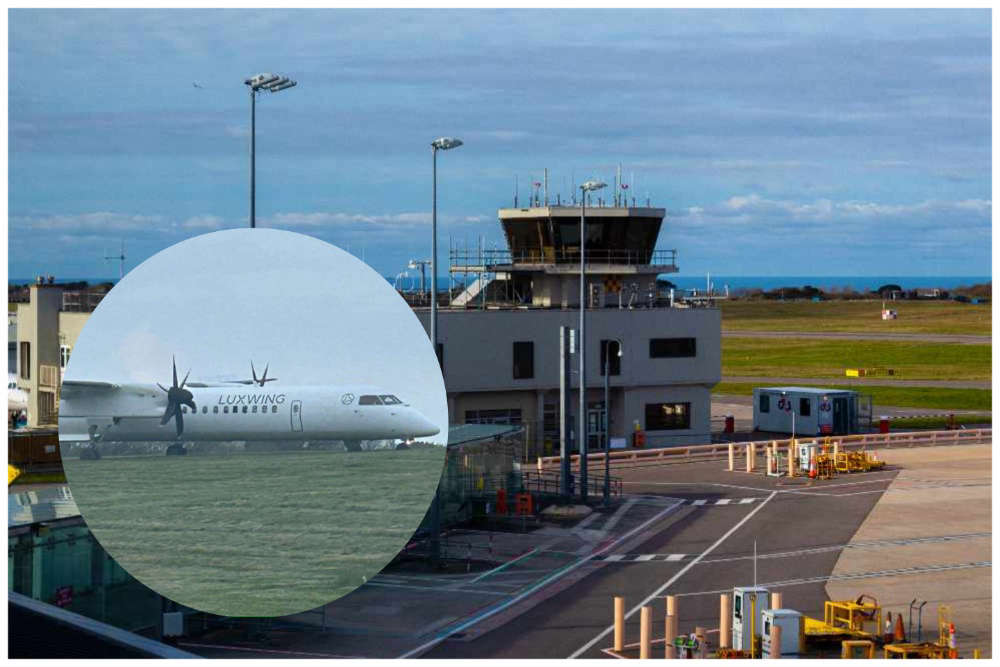
Here's the letter penned by more than 95% of staff at St Sampson's High expressing concerns over ESC's plans for transforming secondary education
A response to the Open Letter from the Leaders of the Secondary and Post-16 Education on Island to the Guernsey Community.
We are writing to you to publicly express our concerns and inform you that we do not support the current proposals being pushed forward by the current ESC.
This letter has been written and agreed upon by 88 (95.6%) different staff members made up of teachers, support staff and professionals who work at St Sampson’s High School.
Until now, we as staff have not spoken out against the proposals due to the fact that we have been actively discouraged from expressing our views and speaking out.
Whilst as committed civil servants we respect the States decision to change the Education model, we do feel that our concerns should be known.
Our concerns are as follows:
Transport and Access
Access to the current St. Sampson’s High School and Les Beaucamps sites are already limited.
We believe the proposed changes in terms of road traffic and the practicalities of travelling to and from school are impractical. Whilst we recognise ESC’s position that there is “much work to be done,'' margin for expansion in this area cannot ignore the finite constraints of the island’s geography.
The roads and school car parks are already overloaded and doubling the amount of students attending each site will only exacerbate the situation. There has been suggestion that parents will have to negotiate buses arriving and departing school and, as a consequence, may have to arrive fifteen minutes early and remain until bus routes are clear.
Clearly this will have a detrimental effect. In addition, staff arriving and departing will be severely impacted by this arrangement. Some support staff are only paid for the hours of the school day, it would be unreasonable to expect these professionals not to be able to leave the site.
Furthermore, our students with mobility issues, who require special transport, will not be able to access the site along with their peers and any emergency vehicle that needs to access the site or surrounding areas will be severely hampered by these revised plans.
It has been suggested that Oatlands will be a “drop and stride” zone. This raises concerns regarding who will be responsible for students as they walk to and from Oatlands. Moreover it raises issues as to where the responsibility transfers from parents to school.
There is no doubt there is a considerable safeguarding issue with this suggestion. Additionally, the route proposed from Victoria Avenue along the present ‘Living Streets Walk’ was deemed unsuitable for pupils travelling to and from school by a previous Education Committee.
Schools were advised not to promote its use but agreed at the time to provide access to the rear of the site, which has since been rescinded as an open gate, has been created in the car park. The notion that only three in four teachers will be permitted to park on site is ill-considered.
Many staff need to be able to park their cars on site for a variety of reasons including the need to pick up their own children, to transport work and folders home for marking and the requirement to attend multi-agency meetings. Ultimately, this will have a detrimental effect on teachers' ability to carry out their professional duties along with their private obligations.
Staff already teach across the Federation of Secondary Schools and the number of staff travelling is likely to increase with the proposed A-Level/IB provision across two sites. The expectation that staff will car-share or seek alternative modes of transport ignores the limited availability of public transport from the outer parishes and relies on a presumption that staff are able to travel together regardless of their location or family demands.
Infrastructure concerns for the current St. Sampson’s High School building.
Lack of interior space at the St Sampson’s site is already presenting problems. Currently over 700 students are on roll and corridors have already proven to be of insufficient width. Difficulties regularly occur as students move around the building.
Lack of space can lead to bumps and collisions that are not conducive to a calm and purposeful learning environment. The consequence of doubling the number of students travelling through corridors including ‘pinch points’ is a health and safety risk. Students as young as eleven, and as old as eighteen, will still be required to use the same corridors.
This will result in some areas becoming impassable. We expect that this will lead to a rise in students displaying difficulties with physical, as well as mental health and well-being issues. At St Sampson’s High there was a noticeable difference this September when the Year 7 cohort was increased by approximately forty students and concerns have already been expressed about the impact of the larger September 2020 cohort.
Under the plans, student lunchtimes would need to be split over three different sittings, not the two that have been suggested in the current proposals. The proposed dining space is wholly inadequate to provide facilities in two sittings. At the current St Sampson’s site, for years, staff have expressed a concern about the lack of social space for students.
Currently there is only one social area, catering for approximately 120 pupils with space for another 120 pupils in the canteen. The current proposals suggest the capacity will be marginally increased to cater for 280 pupils. With over 700 students currently on role there is insufficient dry and warm space for students to relax, eat and socialise during social times.
This has led to the majority of KS4 students sitting on the corridors outside of classrooms and staff offices. Without an increase in dining/social space in the current plans, during staggered lunch sittings, students will be socialising on the corridors outside of classrooms where learning is timetabled.
Having students socialising and playing outside a room that is being taught in will result in fractured concentration levels and lead to a reduction in quality of learning experience. With 800 pupils taking lunch at any one time and capacity for only 280 to be seated there is an inevitability that current difficulties can only be exacerbated.
Given that three lunch session will be needed, staff may not be able to offer support at lunchtimes to students who need extra 1:1 assistance; students will be split from their friendship groups and vulnerable students will be left without their support. Even with three sittings, there is not enough space or time for students to eat and current catering arrangements will not be sufficient to provide for the needs of all students.
Outside Space and Facilities
The lack of outside space is a cause for concern; 1600 students (including Le Murier) cannot be restricted to less space than we have currently for 700 students. In accordance with the Peter Marsh report which has been repeatedly used by the ESC to justify its decisions, there is a notable lack of ‘soft play’ areas which will require students to be transported off-site to other sports facilities which will have a detrimental impact on their educational outcomes and attainment.
This is an island that actively supports and promotes the ‘Healthy Schools Award’, yet students are having their exercise space dramatically reduced in order to accommodate annexes that are being built to make the two-school model “work”. In addition the island is also keen to become accredited as UNICEF Rights Respecting; however, the drastic reduction of outdoor space may well violate Article 31 of the CRC: “The Child's Right To Play: States Parties recognize the right of the child to rest and leisure, to engage in play and recreational activities appropriate to the age of the child and to participate freely in cultural life…”
This extension will take away valuable sporting and recreational space; the remaining area will be insufficient to meet the exercise needs of the students; our students will suffer both physically and mentally from a lack of exertion which they are, inalienably, entitled to. Furthermore, for our more vulnerable students, the time and space to exercise can relieve tension, refocusing and reinvigorating them.
Research shows that the number of behavioural difficulties in the classroom is higher if there is no space for students to use up energy during breaks. A reduction in our outdoor spaces, coupled with a reduction in lunchtime will result in a rise in behavioural issues which are, at the least, disadvantageous to the individual student but, more importantly, will not lead to the increased opportunity and attainment promised by the ESC in the new model.
Enrichment and Length of the School Day
The plans proposed under the current ESC discuss lengthening the school day for student enrichment. There will be resulting implications for other extra-curricular providers outside school, e.g. dance schools, swimming, sports training and the Music Service amongst others.
There will be knock on effects for our local community which actually already provides a very rich variety of activities for children to be involved in. The argument that not all pupils are in a position to access enrichment activities out-of-school belies the considerable charitable work done by many institutions to support children and families on a lower income.
Some students already have an aversion to attend school. Prolonging their school day will have a negative impact on school attendance - one cannot insist that students attend and doing so will cause resentment and negativity. Increasing the length of the school day would also have a knock-on effect of staff.
Lengthening it, for some, will impact on childcare, may raise the costs and shortens their own family time. Expectations for teachers to stay later will mean that staff will be taking more work home with them as marking and planning will have to be done even later in the evenings.
Family time is important for students mental health and well-being as well as teachers. Many parents have expressed their view that students spend long enough at school.
It is important to them that students have sufficient time to relax and enjoy precious family time. Sixth Form Provision Students who are studying A-Level subjects are expected to spend the same amount of hours working independently as they do in the classroom.
This means that, theoretically, Sixth Form students will be working 6-8 hours per day at school (class time plus independent study). There is a concern from staff that there is nowhere displayed on the current plans where Sixth Form students can work independently. In practical subjects such as art, music, drama, design and technology etc ‘A’ level students require specialist areas in which to complete their independent studies.
This space is not evident in the planning. Smaller Schools Research shows that smaller high schools, with under 1000 students, have higher attendance, higher levels of attainment, a higher engagement in extra-curricular clubs and activities, stronger teacher/pupil relationships and generally fewer behaviour issues.
Student and staff morale is also higher and numbers of students suffering mental health and wellbeing problems are decreased. Finland is recognised as having one of, if not, the best education system in the world and it does not have large schools. In recent years, research shows that cost savings provided by large school have had a negative effect on student achievement and graduation rates.
As schools get bigger, students achievement declines and larger schools have higher rates of absence, dropouts and discipline problems. Summary Staff are extremely frustrated with the lack of meaningful consultation.
Opportunities for staff to approach those behind the plans are irrelevant as staff feel unable to voice their concerns or are consistently dismissed. It is felt that there is very much a 'divide and conquer' atmosphere at present, and there is a lack of consistent, transparent communication which is causing a culture of distrust.
At the root of teachers' career choices is a desire to provide excellent education for students - any concerns that we have reflect that, and yet are being treated as though they are just an effort to be troublesome.
We have composed this letter to request pause and reflection on the current proposals. There is no guarantee that Education will improve and Deputy Matt Fallaize has admitted that he does not know how long it will take for exam results to improve if the current proposals are implemented.
This means we will be playing with the future of many of the young people we teach whilst the model embeds, if indeed it does. We believe the negatives heavily outweigh any educational benefits and as a result, do not see how the plans will lead to improved outcomes for all learners.
As an alternative we believe that three or four 11-16 High schools of mixed ability with one dedicated Sixth Form space is seen as a much better alternative. We are keen and ready to support the ESC and Education Department in the transition to a new model of education which engages all our island’s children, offers them the widest range of educational opportunities and ensures the highest outcomes.
However, we do not feel that the proposed plans as they stand meet those objectives. We feel that more work on the transition is necessary and recognise the concerns of the community for what has been seen as a rush to complete this process before the next election. To summarise, we do not support the current proposals being put forward by the current ESC and support the requete that is being put forward by Deputy Dudley-Owen and Deputy Prow.
Comments such as “be a radiator, not a drain… we don’t want drains in our system,” “Shut up and put up,” and assurances that any concerns we may have are irrelevant as “The train has left the station,” do not reassure teaching staff that thorough consultation is really a priority of those managing this change.
Furthermore such a climate has left teachers who do voice their concerns fearing for their jobs. It is not in the nature of teachers or support staff to voice concerns in this way. Ordinarily we would consider it inappropriate to do so.
However, having seen the island bombarded by multiple reports implying that all teaching and support staff are supportive of the current proposals, we no longer feel we have any option other than to voice our concern directly.
In conclusion, whilst we agree with the Executive Leadership Team that delay and uncertainty are difficult, we strongly feel that to continue along the present path without pause for reflection and improvements to the current transition model will lead to a calamitous result for education and the island as a whole.
We therefore ask all Deputies to support the requete to allow time to ensure the best outcomes for our young people


 Fourth electric bus trial begins in Guernsey
Fourth electric bus trial begins in Guernsey
 WATCH: Barfleur's trial docking in Guernsey a success
WATCH: Barfleur's trial docking in Guernsey a success
 Texas and Tom Grennan to headline Weekender in a new location
Texas and Tom Grennan to headline Weekender in a new location
 Crew of plane that overshot runway had landed in Guernsey many times
Crew of plane that overshot runway had landed in Guernsey many times
 Brittany Ferries tests Barfleur in Guernsey and announces discounted fares
Brittany Ferries tests Barfleur in Guernsey and announces discounted fares
 DFDS reveals plans for hybrid electric ferry for Channel Islands
DFDS reveals plans for hybrid electric ferry for Channel Islands
 Air Accident Investigators head to Guernsey after Aurigny aircraft overshoots the runway
Air Accident Investigators head to Guernsey after Aurigny aircraft overshoots the runway
 Aurigny flight overshoots Guernsey airport runway
Aurigny flight overshoots Guernsey airport runway
